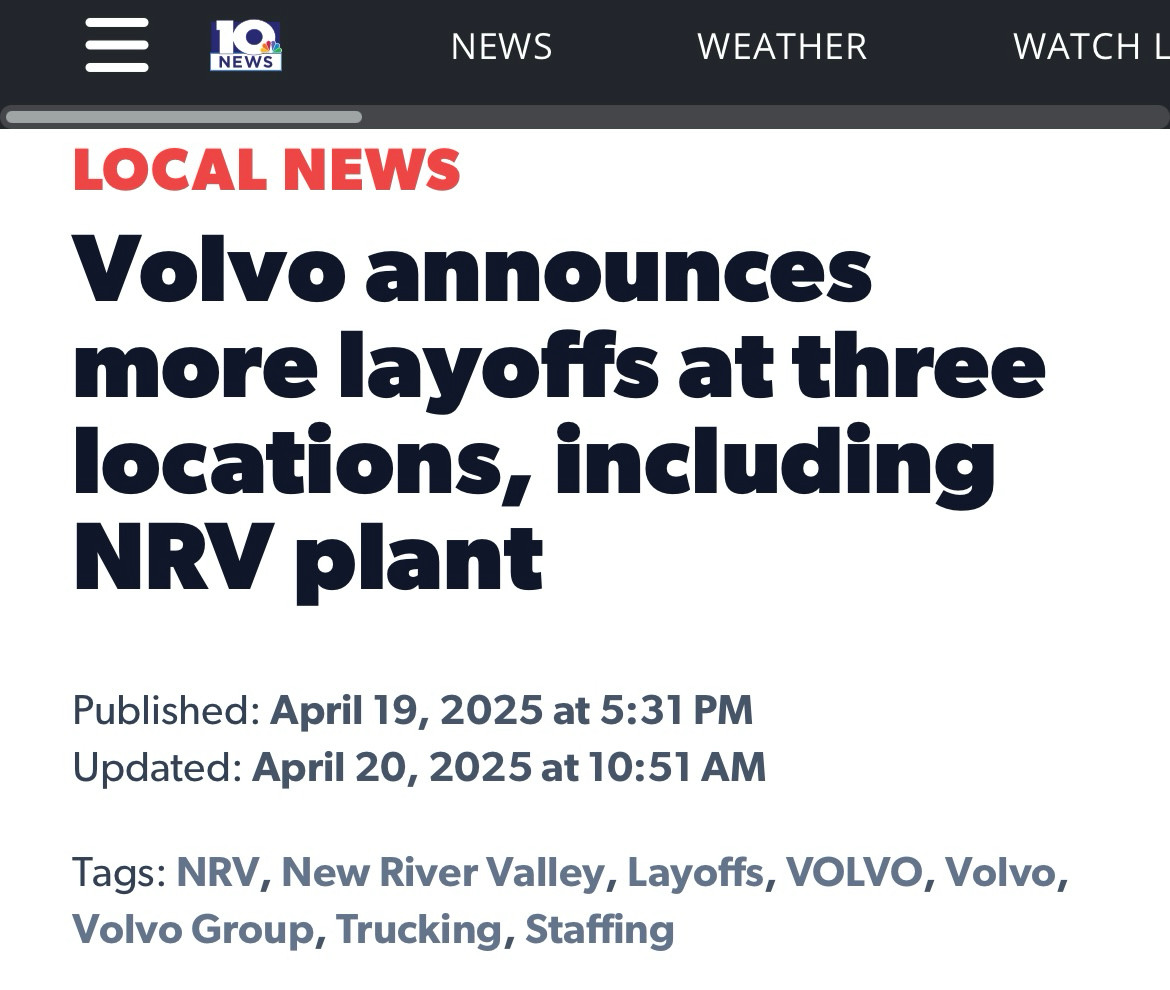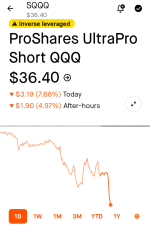USCHO Fan Forum
-
The USCHO Fan Forum has migrated to a new plaform, xenForo. Most of the function of the forum should work in familiar ways. Please note that you can switch between light and dark modes by clicking on the gear icon in the upper right of the main menu bar. We are hoping that this new platform will prove to be faster and more reliable. Please feel free to explore its features.
You are using an out of date browser. It may not display this or other websites correctly.
You should upgrade or use an alternative browser.
You should upgrade or use an alternative browser.
Business, Economics, and Taxes: Eat Cereal for Dinner
- Thread starter MissThundercat
- Start date
walrus
Wind up workin' in a gas station
Wait until the parts to keep existing trucks on the roads are in very short supply
But I am sure Gretchen will get Trump to get more jobs for Michigan!
#BendThatKnee
Handyman
Hug someone you care about...
Brian Tyler Cohen (@briantylercohen.bsky.social)
A Delta flight just caught on fire in Orlando, Florida. (Video per Dylan Wallace)
As someone who has to fly next week..yikes!
D
Deutsche Gopher Fan
Guest
Hey to be fair the university of Michigan dropped to their knees before big Gretchen!
But I am sure Gretchen will get Trump to get more jobs for Michigan!
#BendThatKnee
Handyman
Hug someone you care about...

Catherine Rampell (@crampell.bsky.social)
JFC. So far, Trump has caused markets to lose about 14%. Here's how the same period to date looks under other recent presidential terms
rufus
rock and roller
Would these be manufacturing jobs in the US?
But I am sure Gretchen will get Trump to get more jobs for Michigan!
#BendThatKnee
I thought we were going to be adding those.
Slap Shot
I got nothing
Yeah - it's bad enough I have to fly with a burner phone now I have to worry if we'll even stick the landing at LAX and MSP.
Brian Tyler Cohen (@briantylercohen.bsky.social)
A Delta flight just caught on fire in Orlando, Florida. (Video per Dylan Wallace)bsky.app
As someone who has to fly next week..yikes
Kepler
Si certus es dubita
We have been assholes all the way.
Wealth inequality began shaping human societies more than 10,000 years ago, long before the rise of ancient empires or the invention of writing.
That’s according to a new study led by Washington State University archaeologist Tim Kohler that challenges traditional views that disparities in wealth emerged suddenly with large civilizations like Egypt or Mesopotamia. The research is part of a special issue of the Proceedings of the National Academy of Sciences, co-edited by Kohler and Amy Bogaard, an archaeologist at Oxford University in England.
Drawing on data from over 47,000 residential structures across 1,100 archaeological sites worldwide, the researchers used house sizes as a measure of wealth. Their analysis shows that wealth inequality started to increase roughly 1,500 years after the advent of agriculture in different civilizations across the world. This effect was driven by population growth, competition for land and the development of hierarchical settlements.
“Many people imagine early societies as egalitarian, but our research shows wealth inequality took root surprisingly early,” said Kohler. “The shift wasn’t instantaneous. It grew gradually as societies expanded, populations increased and resources became more constrained.”
The study highlights several key factors contributing to inequality. As farming communities grew, land became a finite resource, leading to competition and innovations like terracing and irrigation to boost productivity. Over time, larger settlements emerged as hubs of economic and political activity, where wealth began to concentrate in the hands of a few households. These wealth disparities were particularly evident in high population settlements, which exhibited greater inequality than smaller communities.
One of the study’s significant revelations is that wealth inequality predates written records, with evidence showing disparities existed even in the earliest agricultural societies. By applying the Gini coefficient—a standard measure of inequality—to ancient house sizes, researchers discovered that early farming villages were relatively egalitarian. However, as settlements became larger and more complex, economic disparities grew.
Russell Jaslow
Registered User
Not surprised at all.We have been assholes all the way.
The more things change, the more they stay the same.
FadeToBlack&Gold
Microlot Marxist
At first, the bright exploited the average and low-functioning masses for their personal benefit. Eventually, their spawn got dumber as it always does, and the subsequent generations simply got richer off of timely investments, interest, and equity. Thus, now the stupid rich can exploit and typically defeat even the intelligent poor.
Handyman
Hug someone you care about...
Lora Kolodny (@lorak.bsky.social)
Tesla reported a 20% drop in automotive revenue as Q1 results missed even tempered Wall Street expectations... (this is a developing story check back for updates) https://www.cnbc.com/2025/04/22/tesla-tsla-earnings-report-q1-2025.html
Tesla reported a miss on the top and bottom lines in its first-quarter earnings report on Tuesday as automotive revenue plunged 20% from a year earlier.
Here are the key numbers compared with LSEG expectations.
- Earnings per share: 27 cents adjusted vs. 39 cents estimated
- Revenue: $19.34 billion vs. $21.11 billion estimated
Total revenue slid 9% from $21.3 billion a year earlier. Automotive revenue dropped 20% to $14 billion from $17.4 billion in the same period last year.
Tesla said one reason for the decline was the need to update lines at its four vehicle factories to start making a refreshed version of its popular Model Y SUV. The company also pointed to lower average selling prices and sales incentives as a drag on revenue and profit.
Net income plummeted 71% to $409 million, or 12 cents a share, from $1.39 billion or 41 cents a year ago.
Handyman
Hug someone you care about...
Faiz Siddiqui (@faizsays.bsky.social)
🚨 Tesla posts a $400M profit, down 71% year-over-year. Revenue is down nearly $2B compared to the same time last year. Wow.
But the kicker:
Faiz Siddiqui (@faizsays.bsky.social)
Without $595M in automotive regulatory credits, which other manufacturers buy off Tesla to comply with emissions requirements, Tesla would have posted a loss this quarter.
Tesla would have lost money if not for selling off regulatory credits to other companies.
Handyman
Hug someone you care about...

Peter Sterne (@petersterne.com)
Comptroller candidate Justin Brannan says NYC must divest from Tesla. As @cityandstateny.bsky.social recently reported, NYC pension funds own about 3 million shares of Tesla worth $1.25 billion (well, now it's worth considerably less)...
bronconick
Yep, still here
I mean, duh. I didn't need a study for that. Once people transitioned from Hunter-Gatherers to agriculture, the guys with the best dirt got to be head of the well, dirt pile.We have been assholes all the way.
Jimjamesak
Already insane, UAA making it worse
Wall Street is living in a desperate fantasy land where they use any hint from the Dump administration to suddenly go “buy buy buy!”Was going to reshort the market today but remembered that I cashed out for a reason. Dodged that bullet.View attachment 408
The reality of the economy is not reflected in the stock market, and likely never will as long as Dump is President.
Handyman
Hug someone you care about...
Yup today they bought because they got some idea the trade war might be cooling...so dumb.Wall Street is living in a desperate fantasy land where they use any hint from the Dump administration to suddenly go “buy buy buy!”
The reality of the economy is not reflected in the stock market, and likely never will as long as Dump is President.
D
Deutsche Gopher Fan
Guest
Gå bort, troll

